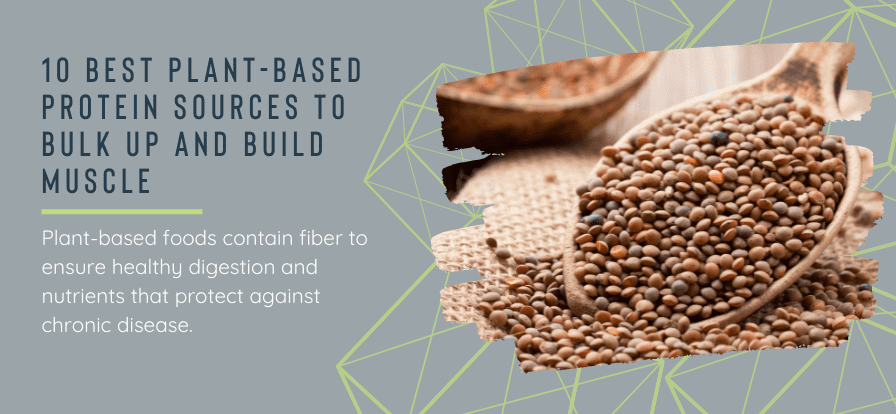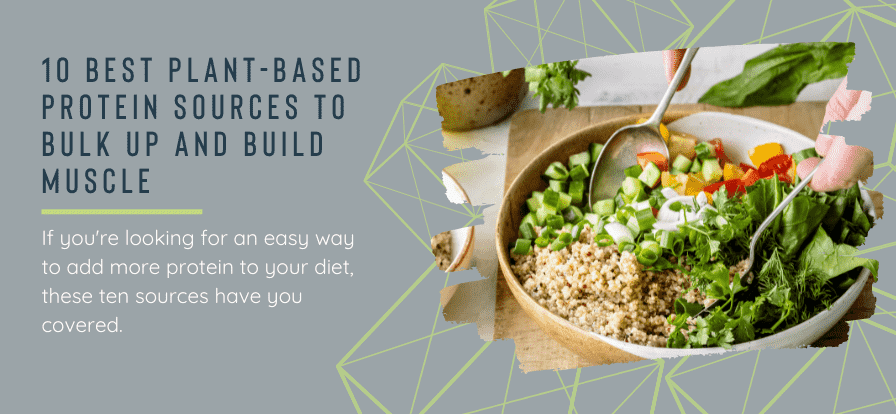10 Best Plant-Based Protein Sources To Bulk Up and Build Muscle
Written by Stephanie Hodges, MS in Nutrition and Exercise Science, Edited by Martin Ebner, head PT and Sports Nutrition Specialist at Ebylife.
Can a plant-based diet supply enough protein to help you build muscle? Well, vegan bodybuilders have clearly shown that it’s possible to build an incredible physique without consuming animal products. But this post isn't solely for vegans and vegetarians, eating more plants benefits everybody!
Plant-based proteins are ideal fuel to bulk up and build muscle. In addition, every plant you eat will contain fiber, vitamins, and phytonutrients that provide additional health benefits.
So, let's briefly touch on the recommendations for protein, and then we'll jump into the list of 10 plant-based protein sources that will help you build muscle.
Why You Need Protein and How Much to Consume
Protein is a frequent topic on the blog because this macronutrient is absolutely vital to your health and ability to build and maintain lean mass. Protein plays an essential role in:
Building and repairing muscle tissue
Maintaining fluid balance
Providing energy
Creating enzymes and hormones
Regulating cell growth
Bone health
And much more!
As you can see, inadequate protein intake can adversely affect your health in multiple ways. And you want to ensure that doesn’t happen!
How much protein do you need?
The recommended dietary allowance (RDA) for protein is 0.36 grams per pound or 0.80 grams per kilogram of body weight. So a person weighing 150 pounds (68 kg) should consume 54 grams of protein daily.
Although this is just the bare minimum amount needed to avoid deficiency, most people consume enough protein. In fact, an article from the New York Times states that most American adults eat about 100 grams of protein a day - certainly sufficient to meet the minimum recommendations. With that said, when your goal is to build muscle, my suggestion is that you aim for significantly more than the RDA. Around 1g per 1lb of body weight should do it.
Animal products are the top source of protein in the average diet. People trying to build muscle usually consume foods like lean meat, eggs, whey protein, and other high-calorie foods.
But animal foods aren't the only way to get sufficient protein in your diet for building muscle, let’s look at some plant-based options.
10 Best Sources of Plant-Based Protein
Whether you're a vegan, a vegetarian, or an omnivore, including more plant-based protein in your diet is a wise move for your health. Plant-based foods contain fiber to ensure healthy digestion and nutrients that protect against chronic disease.
Here are ten sources of plant-based protein you should aim to include in your diet.
1. Beans
Beans are well-known for being a high source of protein in plant-based diets. Most varieties, like black beans and garbanzo beans (chickpeas), have about 15 grams of protein in one cup.
You can eat beans as a side dish or main course over rice, but some other creative ideas to eat more beans are to:
Make a bean-based soup or stew
Add beans to your salad
Use them as a replacement for ground beef in tacos or chili
Make a bean dip to eat with fresh vegetables or pita chips
Cook up a black bean patty
You can even use beans in baked goods. It may sound strange, but you'll never even know beans are included in many dessert recipes using beans.
2. Lentils
Lentils are another plant-based protein that's easy to cook with and versatile in recipes. One cup of cooked lentils contains 18 grams of protein.
Lentils are relatively bland, which is a plus when trying to incorporate them into different recipes. However, if you're planning to eat them alone, on rice, or in a soup or stew, you'll want to season them generously with herbs, spices, and sauces.
Many Indian and Middle Eastern dishes contain lentils. They're also a staple in vegan recipes, and cooked lentils are often a key ingredient in vegan burgers and "meatballs." You can also use them as a replacement for ground beef in recipes like shepherd's pie or lentil loaf.
3. Quinoa
Quinoa is a plant protein native to South America that's often referred to as a grain, even though it's technically a seed. Quinoa is one of the few plant-based foods that contains all nine essential amino acids, making it a complete protein source.
One cup of cooked quinoa contains about eight grams of protein. Quinoa is perfect for post-workout meals because it digests quickly and provides the amino acids your body needs to repair and rebuild muscle tissue.
You can use quinoa instead of rice or other grains, and it's also a great plant-based protein option for salads and veggie bowls. You can even use quinoa in baking recipes like muffins, pancakes, and cookies.
4. Spirulina
If you're looking for a plant-based protein out of this world, look no further than spirulina. This blue-green algae (cyanobacteria) is not only a rich source of protein, packing 4 grams in a single tablespoon, but is also one of the few plant-based sources of B12.
In addition, spirulina is an excellent source of various other vitamins and minerals, making it a remarkably nutrient-dense food. And if that's not enough to convince you, spirulina is also thought to have health benefits, including boosting immunity, detoxifying the body, and reducing inflammation.
Spirulina is a common ingredient in plant-based protein powders, you can also add spirulina to smoothies, juices, and plant-based milk.
5. Chia Seeds
Another small but mighty plant-based protein source is chia seeds. Two tablespoons provide 4-5 grams of protein.
Chia seeds are also an excellent source of fiber and omega-three fatty acids. And like spirulina, they're thought to offer many health benefits, including improving digestion, reducing inflammation, and promoting heart health.
Chia seeds can be eaten whole or ground. They can be added to smoothies, salad dressings, baked goods, or used as a topping for whole grains bowls, oatmeal, yogurt, or even made into a pudding.
6. Hemp Seeds
These seeds come from the hemp plant, which is related to cannabis (but a different variety). Hulled hemp seeds contain about 10 grams of protein in 3 tablespoons. Like quinoa, hemp seeds are a complete protein source as they have all nine essential amino acids.
They're also an excellent plant-based source of omega-three fatty acids and many vitamins and minerals such as vitamin E, thiamin, iron, potassium, phosphorus, magnesium, zinc, and more.
Hemp seeds can be eaten whole, ground into flour or meal, or turned into hemp milk. They have a slightly nutty flavor which makes them versatile in recipes. For example, they can be used as a topping for oatmeal, in smoothies, or similar to the other methods listed for the seeds above.
7. Tofu, Tempeh, Edamame
Soy is another plant-based complete protein. Tofu, tempeh, and edamame are all made from soybeans and are therefore rich in protein and other nutrients.
One cup of cooked edamame has 17 grams of protein, and one cup of tofu has 20 grams. Tempeh is slightly lower in protein with 15 grams in one cup, but it has a higher fat content and a firmer texture.
Tofu is the least processed of the three and has a softer, custard-like texture which is more versatile for savory or sweet dishes—for example, adding to a smoothie.
You will find a lively debate about the health effects of soy, but many of the feared adverse effects are primarily linked to soy supplements and soy protein isolate. According to Harvard Health, it’s ok to eat whole foods like tofu, edamame, and soy milk.
8. Nuts and Nut Butters
Nuts and nut butters such as peanut, almond, and cashew are high in unsaturated (healthy) fats and protein. These foods are also high in calories which is essential when you're looking to put on weight or bulk up.
Half a cup of cashews has 12 grams of protein and 360 calories. Half a cup of almonds has 14 grams of protein and over 400 calories. So when it comes to getting protein from nuts and nut butters, be sure to watch your portion sizes or you could end up putting on more bulk than you intended!
Ways to eat nut butters include:
Add to smoothies
Add to oatmeal or cereal
Top pancakes or waffles
Spread on apples or celery
Bake into cookies or bars
9. Vegetables
Did you know that many vegetables contain protein? A lot of people assume they’re all carbs, but that’s not the case! Some vegetables with the highest protein content per serving include
Asparagus - 4 grams per cup
Broccoli - 4 grams per cup
Brussels sprouts - 5 grams per cup
Green peas - 8 grams per cup
Portabella mushroom - 4 grams per cup
Potatoes - 4 grams in one medium potato
Spinach - 5 grams per cup
By simply eating several cups of vegetables throughout the day, you will be loading up on vitamins and nutrients and consuming a sizeable chunk of your daily protein needs.
10. Plant-Based Protein Powders
Plant-based protein powders are a quick and easy way to get more protein into your diet. Mix them with plant-based milk to make a protein shake or smoothie. Or you can add them to pancakes, oatmeal, muffins, and other baked goods for an extra protein punch.
Plant-based protein powders are made from plant sources such as pea protein, rice protein, hemp protein, and chia seeds. Most plant-based protein powders are also fortified with vitamins and minerals.
When choosing a plant-based protein powder, read the label carefully. Some products may contain added sugars, fillers, or other ingredients you want to avoid.
Stil
Plant-Based Nutrition to Help You Meet Your Goals
So there you have it! Ten plant-based sources of protein to help you bulk up and build muscle. Whether you're looking for an easy way to add more protein to your diet or you want a protein shake that will help you reach your fitness goals, these ten sources have you covered.
If you’re still in doubt about what to eat and how much, check out our ultimate bulk-up diet plan for Vegans.
Vegan Bulk-Up Diet Plan For Skinny Guys
Welcome to the ultimate Vegan Bulk-Up diet plan for skinny guys.
What’s included in the diet plan:
✔ A fully comprehensive and easy-to-follow 7-day food plan (To be repeated until you reach your ideal weight and/or results).
✔ A carefully calculated calorie surplus, macronutrient split and precise measurements to maximize weight gain and encourage muscle growth for Skinny guys.
✔ 2 Delicious post-workout smoothie recipes to help fuel your gains.
✔ A weekly grocery list and instructions.
✔ A sample workout from our 5-day split bulk-up workout plan for skinny guys.
✔ Combines perfectly with all of our Skinny Guy bulk-up workout plans.
This diet plan is perfect for Ectomorphs and ‘hardgainers’ looking to build muscle and gain weight.
The file is in PDF format and is compatible with all phones, computers, and tablets.





